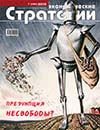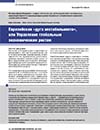Arch of Instability in Eurasia and Global Economic Growth Control
DOI: 10.33917/es-7.165.2019.46-56
Modern global economic and political transformations that result on the one hand in the relative weakening of the American global influence in the world and on the other hand in formation regionalized centers of the economic growth and influence create the risks of intensification of the regional contradictions and conflicts that affect the interests of the key economic players. Potential emergence of the “arch of instability” in the southern part of the Eurasian continent that can be used by the US to accommodate its interests with providing the base for non-force and/or partially force-based instruments of control of the global and sub-global economic processes. The emergence of such an arch could alter significantly the configuration of the political and geopolitical interests in the priority regions with the most intense trends for the global economic growth thus creating new military-political and political risks. The formation of the “arch of instability” could create new risks for the interests of Russia and its partners in the post-Soviet Eurasia
References:
|
1. Haas R. How a World Order Ends And What Comes in Its Wake. Foreign Affairs, available at: January/February 2019, available at: https://www.foreignaffairs.com/articles/2018-12-11/how-world-order-ends. 2. Zakaria F. The End of Economics? Human beings are rarely rational — so it’s time we all stopped pretending they are. Foreign Policy, Winter 2019 Issue,available at: https://foreignpolicy.com/gt-essay/the-end-of-economics-fareed-zakaria/ 3. Walt S. The era of unilateralism is over — and Washington is the last to realize it. Foreign Policy, 2019, April, 26, available at: https://foreignpolicy.com/2019/04/26/america-isnt-as-powerful-as-it-thinks-it-is/ 4. Walt S. The End of Hubris And the New Age of American Restraint. Foreign Affairs, 2019, May/June, available at: https://www.foreignaffairs.com/articles/2019-04-16/end-hubris.5. 5. Strategicheskoe ekspertnoe soobshchestvo Ust’-Kachka – 2018 [Strategic Expert Community Ust-Kachka – 2018]. Ekonomicheskie strategii, 2018, no 7, p. 24. 6. Evstaf’ev D.G. Globalizatsiya i novye tsivilizatsionnye razlomy: riski i perspektivy dlya Rossii i Evrazii [Globalization and New Civilizational Faults: Risks and Prospects for Russia and Eurasia]. Geopolitika i ekogeodinamika regionov, 2019, t. 5(15), vyp. 1, pp. 22–33. 7. Kortunov A. Vossoedinenie Khartlenda [Heartland Reunification]. Ekspert, 2019, February, 6, available at: https://expert.ru/2019/02/6/vossoedineniehartlenda-geopoliticheskaya-himera-ili-istoricheskij-shans/ 8. Morozov A. Bol’shaya transformatsiya Tsentral’noi Azii: zolotoi vek ili novoe srednevekov’e? [Great Transformation of Central Asia: the Golden Age or the New Middle Ages?]. Evraziya-Ekspert, 2018, February, 20, available at: http://eurasia.expert/bolshaya-transformatsiya-tsentralnoy-azii-zolotoy-vek-ili-novoesrednevekove/ 9. Bogaturov A.D. Novaya struktura geoprostranstvennykh otnoshenii v Tsentral’noi Azii. Energeticheskie izmereniya mezhdunarodnykh otnoshenii i bezopasnosti v Vostochnoi Azii [New Structure of Geospatial Relations in Central Asia. Energy Dimensions of International Relations and Security in East Asia].Moscow, MGIMO, 2007, pp. 69–110. 10. Brzezinski Zb. The Grand Chessboard. American Primacy and Its Geostrategic Imperatives. First Edition, N.Y.: Basic Books, 1997, pp. 123–150, 223. 11. Frankopan P. Shelkovyi put’ [Silk Road]. Moscow, Izd-vo “E”, 2018, 688 p. 12. Brodel’ F. Grammatika tsivilizatsii [Grammar of Civilizations]. Moscow, Ves’ mir, 2014, p. 85. 13. Ageev A.I. Svyazannoe prostranstvo [Connected Space]. Ekonomicheskie strategii, 2018, no 7, p. 5. |



